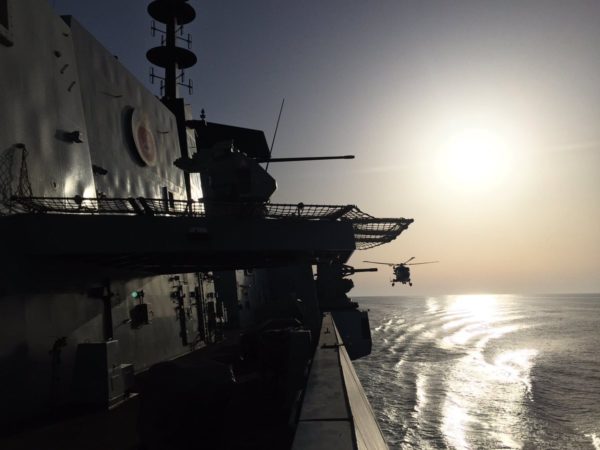London wants a 'European' maritime protection force in the Gulf. The French are responding
(B2) British Foreign Minister Jérémy Hunt announced it on Monday (July 22). The United Kingdom will launch in the Gulf a “ European-led naval force "(European-led maritime) in order to protect ships passing through the Strait of Hormuz against possible attacks from 'piracy' (aka Iranian forces)

A slow rise
The presence will be strengthened little by little. Alongside HMS Montrose (F-236), a Type 23 frigate already on site, the Royal Navy sent the HMS Duncan (D-37), a Type 45 destroyer which should be on site in a few days, by " the July 29 ". It will be the " first step in this process of increasing power ". Objective: to protect ships flying the British flag (oil tankers, liquefied gas carriers, freighters, etc.) sailing in the Strait of Hormuz. Jérémy Hunt, however, wanted to warn that this effort was not military. " We do this not to increase tension, but because we believe freedom of navigation is important. What we are looking for is de-escalation »
A European force, France will respond
« The proposed coalition will be placed under European leadership clarified Jérémy Hunt. Several countries have been contacted to participate in this force, the exact format of which is not specified. France and Germany in particular specified the British minister, having indicated that he had spoken with his counterparts Jean-Yves Le Drian and Heiko Maas. The Netherlands and Norway – two countries with an oil industry – have also been contacted according to our information. France will respond. French Defense Minister Florence Parly assured this Monday afternoon after a telephone interview with her British counterpart Penny Mordaunt. There is a " full solidarity” between France and the UK while a British tanker is still being held by Iran ". " Freedom of navigation in the Gulf is a major security issue for Europeans she said. " We want to work together to guarantee it »
A force distinct from the American effort
This force will act in coordination with the other forces, notably American, present in the area. " We cannot exclude the Americans. We will act in coordination with them they have means of supply at sea or information which are useful for the operation. But this force will be very distinct. The head of British diplomacy, however, made a point of specifying it before the House of Commons, it is not a question for the British of associating with the American efforts in progress aiming at breaking Iran. " It's not part of the American best effort on Iran, because we're committed to the Iran nuclear deal. »
Elaborate rules of engagement
The rules of engagement are being drafted, but the minister did not insist before the chamber to give all the details. Merchant ships will also have to make an effort to increase their safety. " We can't ensure zero risk, but we can reduce it. " All ships flying the British flag transiting through the Strait of Hormuz will have to communicate the date of their passage to " allow us to offer the best possible protection ". Other measures may also be necessary.
A doubly strategic element
This launch is interesting. We had known Britons who were much more Atlantic and less European. Also when Jérémy Hunt, a dyed-in-the-wool Tory minister, announces a " European-led maritime force ", carried out in " coalition » (1) we almost pinch ourselves to tell ourselves that we are not dreaming. Even the most daring European would never have imagined a situation where London demands a 'European' operation (read separate article)
An ongoing campaign
Let's not forget one main element, however: Jérémy Hunt is currently campaigning to run for the post of leader of the Conservative Party and at the same time that of Prime Minister. He has an interest both in toughening his tone, but also in asserting his difference with Boris Johnson on an essential point: cooperation with Europe. By defending the establishment of a European force in the Strait of Hormuz, he affirms his determination. By placing it under the emblem of Europe, it shows the need for a more measured approach than a hard deal. Because, as of today, the British can and will need the Europeans.
A European need
Let's be clear. Even dynamic, the British fleet will not be enough to ensure the protection of ships either flying the British flag or owned or armed by a British company. A coalition of Europeans is needed to secure the strait. Incidentally, this allows the British navy to regain a leading role and mission, since it no longer participates either in the EU anti-piracy force deployed in the Indian Ocean, or in operations in Mediterranean. The Northwood operation HQ will thus be able to regain a maritime vocation that it had lost with the departure of the EUNAVFOR Atalanta operation for a Spanish HQ (due to Brexit).
(Nicolas Gros-Verheyde)
(1) A common term across the Channel to designate the operations of the European Union without mentioning it. In this case, it is not really clear whether the United Kingdom wants to place this force under the command of European structures.
Article modified by expanding aspects of comments in a separate article

